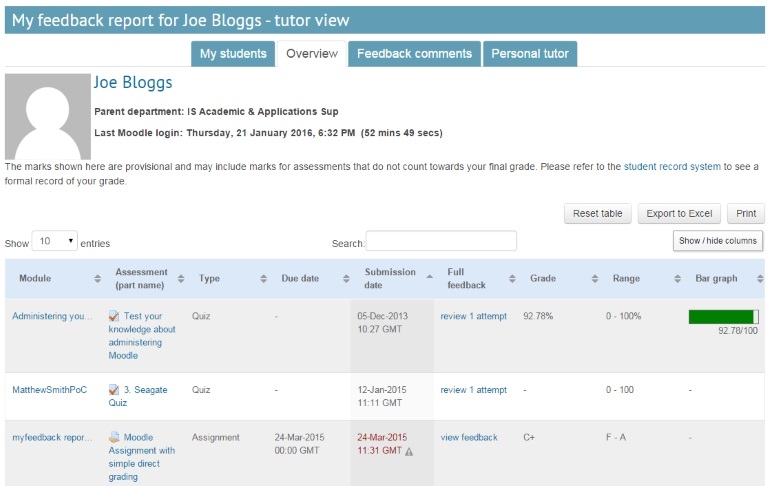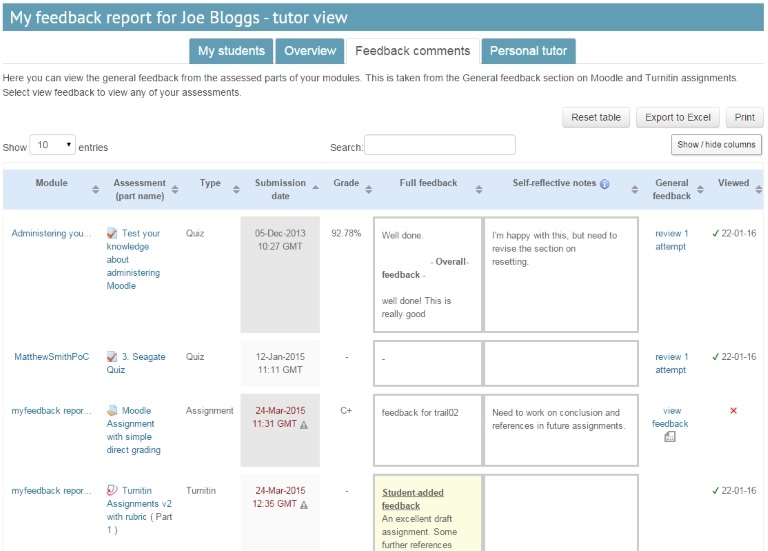Trialling the My Feedback report at UCL
Jessica Gramp talks about a trial of a new Moodle plugin, being developed by ISD, which allows students, their tutors and their personal tutors to view feedback and grades in one place.

17 May 2016
At this year’s Teaching and Learning Conference, Jessica Gramp (UCL Digital Education) told delegates about a trial of a new Moodle plugin, being developed by ISD, which allows students, their tutors and their personal tutors to view feedback and grades more quickly and in one place.
Moodle is the virtual learning environment (VLE) used for all taught modules and programmes at UCL. As well as using Moodle to communicate with tutors and peers, it is widely used for students to submit their assessments and complete practice quizzes. Moodle does not currently show students their feedback across modules on one page, requiring them to access this from each Moodle course independently.
A plugin that pulls together assessment and feedback across Moodle
The plugin is called the My feedback report and displays marks in a single view and in a format that is easily accessible and digestible.
It is being trialled by over 700 students in Engineering and feedback from this pilot is being fed back in to the development of this tool. A number of staff are working on the project, including a full-time developer ad a part-time analyst.
The My feedback report shows a list of grades and feedback for a variety of assessment activities in a single report, including Moodle assignments, Turnitin assignments, workshops for peer assessments and quizzes from across modules.
The report provides links to submissions and any feedback, including grades.
The report helps students better understand the variety of feedback they receive; draw ties between different assessments and modules; and allows them to reflect on their feedback to see how they can improve in future assessments.
It is intended that students will use this tool in partnership with their personal tutors.

Students can also see a bar chart with their performance over time, information about their grade and the marking scale for each assessment.
The feedback tab allows students to see any comments from assessments in the report. Students are then able to compare the feedback received from across all their different assignments.

Well received, but needs further development
Students in the pilot commented that although they found My feedback report useful, it was not perfect.
Using the software requires some technical know-how and the development team will be putting together guidelines to help both staff and students use the tool properly.
Students also asked for more features, including access to previous years’ feedback and information about the weighting of the assignments.
It has been noted that one downside of the tool is that Turnitin feedback is not able to be included in the tool unless copied and pasted in. This is because there is no way to access Turnitin feedback, except within Turnitin itself.
The plugin has been released to the community under an open source license and is available to download from moodle.org. Opening up the plugin to the community means that anyone can help to develop the software, which is particularly important since UCL has only agreed to fund its development for a finite period. This will help the plugin remain up to date in terms of compatibility with future versions of Moodle and enables other institutions to benefit from the work being done at UCL.
Using technology to improve feedback turnaround times and inform personal tutors
Many departments across UCL are moving to providing assessment feedback to students electronically.
Using technology means students can receive their feedback faster and the quality and consistency of the feedback can also be improved.
Although module tutors can only see feedback from the courses they are teaching on, students’ personal tutors have access to all their tutees’ feedback and can use it in their meetings with these students.
One way it can be used is for personal tutees and tutors to see if students have viewed their feedback. It can also be used to identify those students who need extra support.
The plugin is expected to be released to all staff and students at UCL for the new 2016/17 academic year.
For more information, contact the Digital Education team.
 Close
Close

